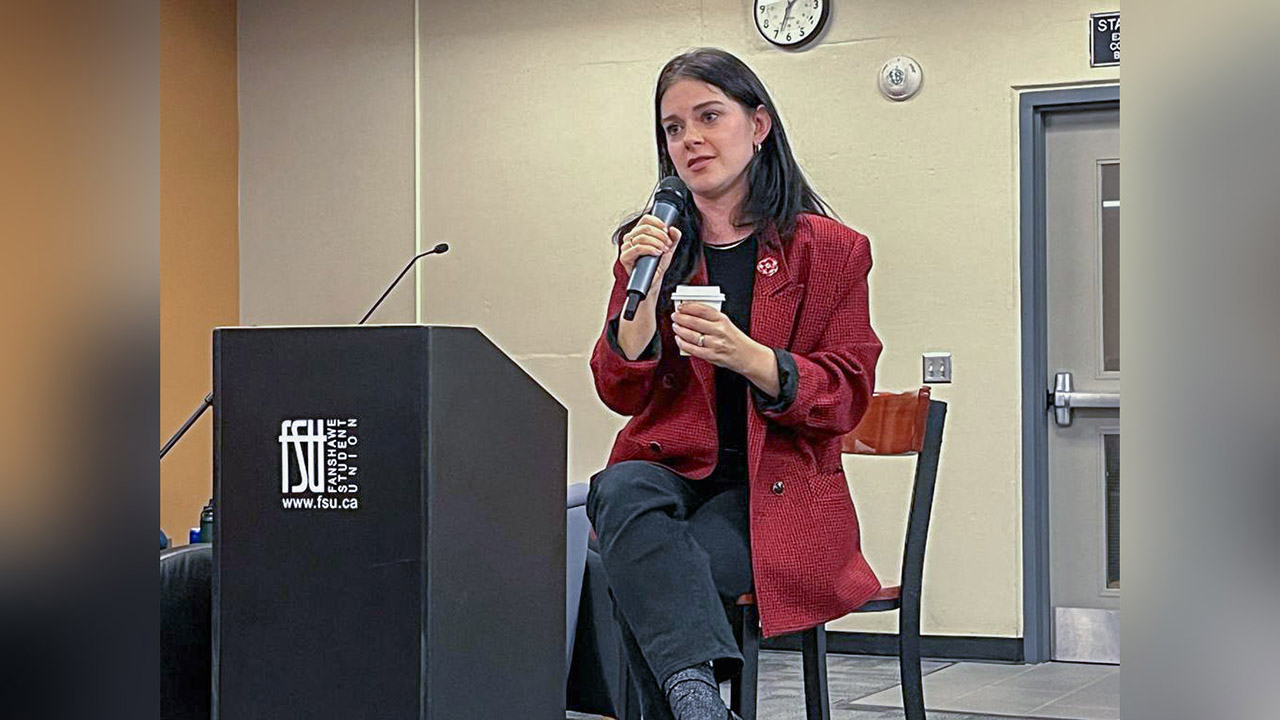Journalist Robyn Doolittle visits Fanshawe
 CREDIT: MAURICIO PRADO
CREDIT: MAURICIO PRADOAward-winning journalist, author, and member of The Globe and Mail's investigative team, Robyn Doolittle (pictured), visited Fanshawe to share the truth about sexual assaults in Canada.
On Nov. 6, award-winning journalist, author, and member of The Globe and Mail’s investigative team, Robyn Doolittle, gave a presentation at Fanshawe College. She spoke about her 20-month-long investigation looking into the ways Canadian police services handle sexual assault cases. The findings exposed deep flaws at every step of the process. The presentation was over one hour long, and around 40 students attended.
Doolittle said that to investigate that topic thoroughly, The Globe and Mail gathered data from more than 870 police forces. She added that it was a journey from start to finish, and the findings were “shocking.”
“The Ontario Provincial Police (OPP) classified 34 per cent of sexual assault cases as unfounded,” Doolittle said. “Unfounded means that the police have done an investigation about a raping and determined that the raping is a fake or baseless accusation.”
She said this is important because “unfounded” does not mean there is enough evidence to convict. Unfounded means denying the veracity of a rape case. Her first step was to go to Statistics Canada or a federal agency to collect crime statistics, where she was able to find large annual crime statistics.
“They told me they do not collect and release those statistics anymore,” Doolittle said. “So, I go to police services, and the police services say we do not release those anymore.”
She said the police told her to fill out a Freedom of Information request if she wanted those statistics. A Freedom of Information request is a process by which we, the people, can access records from public institutions that have not otherwise already been released.
“I had to file hundreds of Freedom of Information requests to get individual unfounded statistics for more than 1,100 police jurisdictions in Canada,” Doolittle said. “It took a year. I went through many cheque books writing $5 application fees.”
She discovered that the rate of unfounded cases in St John, New Brunswick, was 51 per cent. That meant that 51 per cent of sexual assault complaints made to police in that city were being thrown out.
“I found out that when a case is dismissed as unfounded, it is not reported to Statistics Canada as a sexual assault,” Doolittle said. “So, let’s say you have 100 sexual assault cases reported to police. Fifty are reported as fake, and 25 result in an arrest and a charge.”
In other words, only 50 per cent of allegations result in a charge being reported to Statistics Canada. Doolittle said that is significant because nobody understands the actual rate of sexual assault in communities.
To get even deeper into the investigation, The Globe contacted specific police departments to learn more about how they were approaching sexual assault investigations. The Globe sent a survey of 15 questions to more than 100 police services about training, policy, oversight, and resources.
“Only 18 replied with detailed answers,” Doolittle said. “One small Ontario force said the Globe would need to hire a paid duty officer for $68.44 an hour to reply.”
She said that the majority of police departments were not collaborating, but they were able to get enough information through the numerous Freedom of Information requests she submitted.
“It is obscuring our understanding of sexual assault in Canada,” Doolittle said. “Accurate statistics are vital, especially in this age where people don’t want to read things that don’t align with their worldview.”
These findings have changed the landscape of how we speak about reporting gender-based violence, and have prompted a national overhaul of policy, training and practices around sexual violence.

















